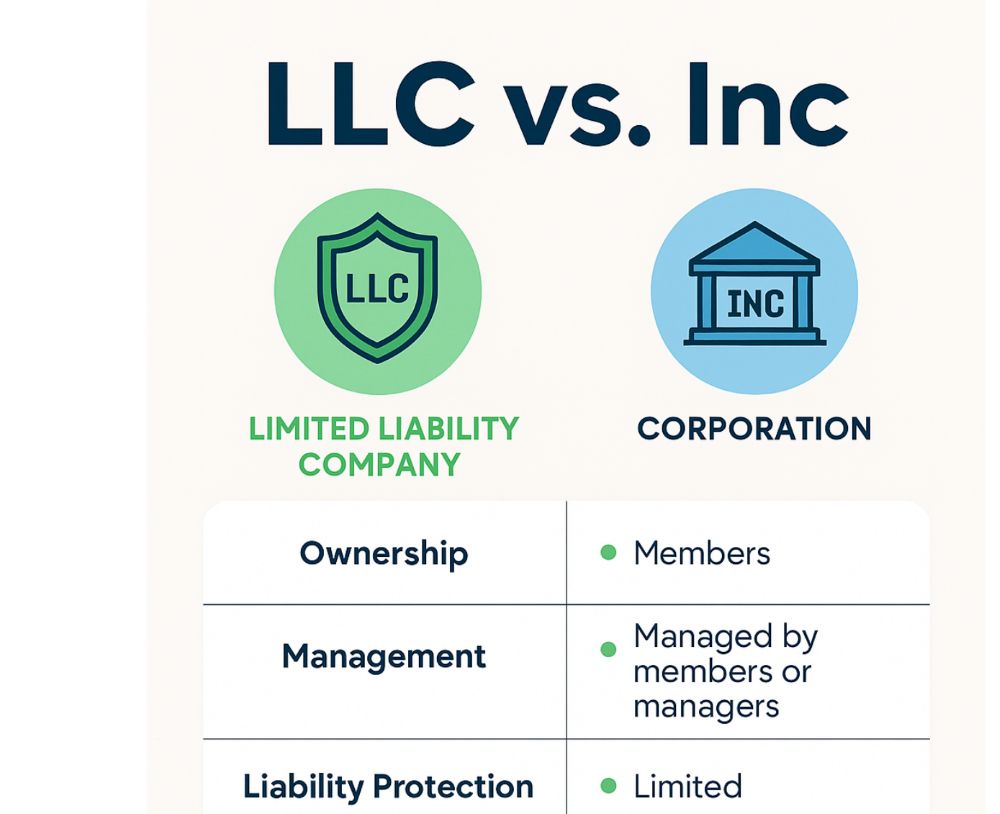LLC versus Inc is one of the most common comparisons entrepreneurs face when starting a business in the United States. Choosing between a Limited Liability Company (LLC) and an Incorporated business (Inc or Corporation) can have long-term legal, financial, and tax consequences. The right choice depends on your goals, industry, growth plans, and preferred tax treatment.

Understanding LLC (Limited Liability Company)
A Limited Liability Company is a flexible business structure that combines elements of sole proprietorships, partnerships, and corporations. LLC owners, called members, enjoy personal liability protection — meaning their personal assets are protected from business debts and lawsuits.
Advantages of an LLC:
- Limited Liability: Your personal assets (home, car, savings) are protected.
- Tax Flexibility: LLCs can be taxed as a sole proprietorship, partnership, S Corporation, or C Corporation.
- Fewer Formalities: No annual shareholder meetings or strict corporate records required.
- Management Flexibility: Members can manage the business directly or appoint managers.
Disadvantages of an LLC:
- Self-Employment Taxes: In some cases, members pay more in self-employment taxes.
- State Variations: Laws, fees, and requirements vary by state.
Understanding Inc (Corporation / Incorporated)
An Incorporated business, often called a Corporation, is a separate legal entity from its owners (shareholders). Corporations are more structured, with a board of directors, corporate officers, and shareholders.
Advantages of a Corporation:
- Strong Liability Protection: Shareholders are protected from business debts and lawsuits.
- Easier to Raise Capital: Corporations can issue stock to attract investors.
- Perpetual Existence: The company continues even if ownership changes.
- Tax Benefits for C Corporations: Certain deductions and lower corporate tax rates.
Disadvantages of a Corporation:
- More Formalities: Required annual meetings, bylaws, and corporate minutes.
- Double Taxation for C Corporations: Profits are taxed at the corporate level and again when distributed as dividends.
- Complexity and Costs: More paperwork and higher formation/maintenance costs.
LLC versus Inc: Key Differences at a Glance
| Feature | LLC (Limited Liability Company) | Inc (Corporation) |
|---|---|---|
| Ownership | Members | Shareholders |
| Management | Flexible (members or managers) | Board of Directors & Officers |
| Liability Protection | Yes | Yes |
| Taxation | Pass-through or Corporate Tax | Corporate Tax (C Corp) or Pass-through (S Corp) |
| Formalities | Minimal | Strict |
| Raising Capital | Limited | Easier via stock issuance |
When to Choose an LLC vs Corporation
- Choose an LLC if you want flexibility, simple management, and pass-through taxation. Ideal for small to medium-sized businesses and startups that do not need to raise capital from many investors.
- Choose a Corporation if you plan to seek venture capital, issue stock, or eventually go public. Ideal for large businesses or those requiring strict corporate governance.
Tax Considerations for LLC versus Incorporated Businesses
One major factor in deciding between LLC vs Corporation is taxation.
- LLCs can choose their tax classification, offering flexibility. By default, profits pass through to the owners’ personal tax returns.
- Corporations (C Corps) pay corporate tax and then shareholders pay personal tax on dividends — known as double taxation. However, S Corporations allow pass-through taxation like an LLC.
For official tax information, you can visit the IRS Business Structures Guide.
Pros and Cons Summary
LLC Pros:
- Flexible management and taxation
- Minimal compliance requirements
- Strong liability protection
LLC Cons:
- Limited access to investors
- State laws vary
Corporation Pros:
- Easier to raise funds through stock
- Strong investor confidence
- Perpetual existence
Corporation Cons:
- More regulations and formalities
- Possible double taxation
FAQ – LLC versus Inc
1. Which is better: LLC or Corporation?
It depends on your business goals. LLCs offer more flexibility and less paperwork, while corporations are better for raising large amounts of capital and attracting investors.
2. Can an LLC become a Corporation later?
Yes. An LLC can be converted into a corporation if your business grows and you want to issue stock or change your tax strategy.
3. Is a Corporation always more expensive to run than an LLC?
Usually yes. Corporations require more paperwork, annual meetings, and state fees, which often makes them more expensive to maintain.
4. Do both LLCs and Corporations protect personal assets?
Yes. Both structures provide limited liability protection to their owners.
5. Which is better for taxes: LLC or Corporation?
An LLC offers more tax flexibility, but a corporation may offer better deductions in certain industries. The right choice depends on your specific financial situation.
Final Thoughts
Choosing between LLC versus Inc is a big decision that shapes the future of your business. If you value simplicity and flexibility, an LLC may be the best fit. If you need to raise capital and follow a formal corporate structure, incorporating could be the smarter choice.
read more click here.